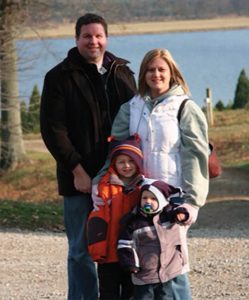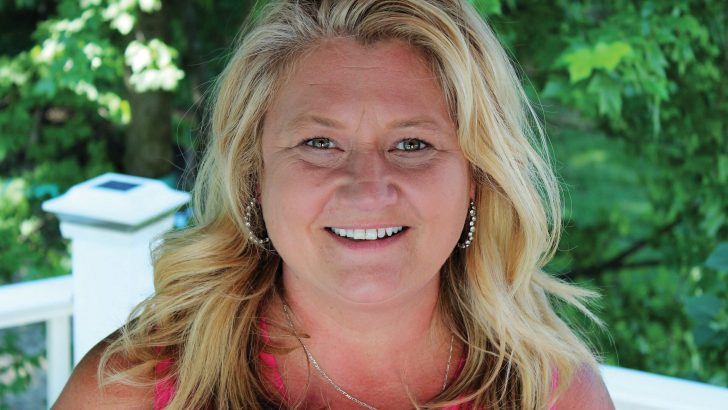Chai Brady speaks to a widow coping with grief and single parenthood
When a freak tornado took a woman’s husband leaving her to raise her two young children by herself, faith, family and her writing helped her through the isolation and sorrow.
Ohio-born and bred, Shannon Savage told The Irish Catholic that despite the tragedy, she came to accept that God had a plan for her life.
“It’s been a pretty incredible journey and I want people to know that when something happens in your life if you can find the patience and have time go by, it’s crazy to be able to look back and see God’s handprints on every part of your journey,” Mrs Savage said.
“I just want so much for people to experience that faith like I did, because it’s a very peaceful, peaceful feeling. It’s a beautiful life.
“I feel like I have a more beautiful life now than I would have if Mark hadn’t died, which is crazy to say but it’s kind of how I feel because I’ve seen and felt God in a way that I never would have if he wouldn’t have died and that’s the ultimate peaceful feeling that you can have. That’s what I hope for people.”
Camping

It was in 2010 when Mrs Savage and her husband decided to go on a camping trip with their two boys, Zane (5) and Xavier (2), in the neighbouring US state of Pennsylvania. It was about 1.30am when a freak tornado came in the middle of the night and her husband Mark was killed underneath their full-sized camper van.
Mrs Savage says the period immediately after the disaster, which happened in June, was “really hard to describe” as she finds it difficult to remember that summer.
“I just was completely pretty much numb, but I do remember after the funeral and everything settled down, feeling very angry. I had a lot of anger, especially at God,” she said.
“Why would a loving God allow this to happen? Why would He allow a man to be taken who had life in the palm of his hand, two little kids, why would he let that happen?” she asks.
“So I had a lot of questions about that. I also went through a lot of guilt, because why was he killed and not me? And I also would have a lot of ‘what if’ scenarios in my head, like, ‘if we would have just done this, this wouldn’t have happened’, ‘if this would have happened then he would still be alive’.”
When asked what helped her through her faith struggle, Mrs Savage said she had a lot of friends who each had a very strong faith. They were “a great source of comfort”, she explains. Progressively her faith started to grow rather than diminish.
Scripture
“It just seemed that from the get go God just started showing me things. I was looking at scripture and things in a whole different way, whereas up until this point I always had faith but I was never real strong in it I guess, it was kind of like I put it on the back shelf,” she says.
“I never really studied the Bible and looked at things for myself and then after Mark died of course I couldn’t get enough of it and it was just like scripture all of sudden was kind of popping out at me and I would just go ‘oh, that makes a lot of sense’.”
She believes that God was calling her to learn more about Him and to learn about Mark’s death from His perspective. The second week after her husband’s death she went back to church, and began writing down some of her “raw emotions”, which she describes was an outlet.
Mrs Savage grew up in a rural environment and now lives just 20 minutes away from her childhood home, where her parents still live. She has 5 brothers and sisters.
“When I look back on my childhood, I had a good happy childhood, was raised in the church but never really understood what it meant to really have a Christ centred heart until I got a little bit older,” she says.
Describing her mother and father as “the most selfless people on the world”, Mrs Savage received a lot of support from them.
“It was just very difficult and I had to learn just to take things one day at a time, if I got ahead of myself I would drive myself crazy,” she says.
Quit
For this reason, about three years after Mark’s death Mrs Savage decided to quit her teaching job which she had been doing for 15 years. “I just felt that I was running myself ragged I couldn’t be there for the boys. That was a huge decision to hang up my teaching career to be home with them which I think is to this day nothing I regret. It was one of the best decisions I made,” she says.
Part of her coping method with the sudden loss of her husband and becoming a single mother became “taking it day by day, giving up my job and just relying on support of those good friends and my parents”.
However, asking for help during that time for her was particularly hard, whether it be from friends or family.
Deal
Mrs Savage explains: “I would say that for me it was very hard for me to ask for help or to tell somebody I was having a hard time because I felt like: ‘OK, God gave me this horrible situation and I’m going to deal with it all on my own because I have to show the world I’m strong and I’ve got this.
“In retrospect now, I think a lot of times a lot of people don’t know what to do and they don’t know what to say and they don’t know if you need help, so I think something I would say is seek out those people that you do trust wholeheartedly and don’t be afraid to say ‘I’m having a really rough time, I’m having a really bad day I need help’.”
“Even though it’s one of the hardest things to do but I wish I could give my previous self that message 10 years ago, that it’s ok to ask for help from people that you trust the most and to completely immerse yourself in God’s Word because when you do that something pops out and he’ll give you these ‘ah ha’ moments and it helps you come to terms with what happened in your life.”
Ten years after Mark’s death, Mrs Savage has produced a memoir, My Walk in June, which is written through the lens of a new widow and mother to her two young boys. The book, she says, would be particularly relevant for women, and men, who find themselves suddenly widowed with children.
“That’s the first audience that comes to mind is people who lose their spouse and having to navigate raising your kids,” she says.
However, she also wants to reach out to those who do not have a Christian faith or have lapsed in their faith. There are also aspects of mental health issues she experienced as a result of the tragedy.
She says: “I definitely want people who don’t have faith to read it to, because hopefully it will help them come to faith, also people who struggle with anxiety and panic, because that what’s happened previously, just about a year and a half ago I got struck really badly, panic attacks almost a decade later. So there’s a whole mental health aspect in there too.”
Isolation, she says, is the perfect word to describe how she felt. Although Mrs Savage had a good support network of friends and family, as time goes by after an incident of the magnitude she experienced, people go back to their lived and daily routine and “you get kind of forgotten about”.
“I never feel like I quite fit in anywhere you know, it’s kind of like I’m not part of a couple so I don’t get invited to couple things with kids because it’s just me, it’s a very isolating spot to be,” she says. The coronavirus pandemic has led to more people becoming isolated due to social distancing concerns and the guidelines of governments across the world. At the time of her husband’s death there were no restrictions and Mrs Savage could have physical support from friends and family, but she reminds anyone in a difficult situation at this time that God is always there.
Scenario
She says: “To be in a situation where you lose your loved one with this kind of scenario, with Covid going on, that’s a great concern because I could have people over, I could have people around me, whereas now it’s kind of limited. That’s a huge concern,” she says, adding that “your constant support that is going to be there and never leave you is God.”
“I think that is even more important than asking humans for help because He is there. When something happens in your life whether it’s good or bad he is trying to grab your attention and he’s trying to teach you something. All you have to do is be open to wanting to hear him speak to you. And to do that you have to spend some quiet time praying and just being still and letting him talk to you. That’s more important than human help in my opinion.”
The reason Mrs Savage wrote the book My Walk in June is twofold, the first was that writing everything that happened in her life became part of her healing process. The second, more importantly, was to show people that although devastating things can happen in people’s lives, “God will take the worst thing that can happen to you and use it for good”.
“I wanted people to be able to see that my Christian faith is the foundation of who I am and I do attribute my faith in getting me through,” she says.


 Chai Brady
Chai Brady Shannon Savage
Shannon Savage 